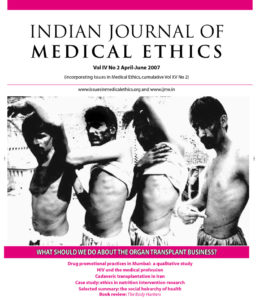
Reports that women survivors of the tsunami are being recruited as organ “donors” for the kidney transplant industry in Tamil Nadu have brought the kidney trade back into the limelight. At the same time, Pakistan is in the midst of bringing in an ordinance intended to prevent organ sale and promote a cadaveric transplant programme. The editorial looks at pressures driving the industry and loopholes in the law to regulate it. A comment notes that two central issues need to be addressed: the effectiveness in implementing the current law, and the financial compulsions that make people donate their organs. An article from Iran discusses the government-regulated system for organ donation that provides compensation to donors, and calls for the development of a strong cadaveric programme.
A qualitative study on the range of promotional practices influencing drug usage in Mumbai provided a picture of what might be described as an unholy alliance between drug manufacturers, chemists and doctors. The study is reported in this issue.
An article looks at instances of dysfunctional behaviour in doctors and their causes, and discusses programmes that help doctors deal with stress, work with diverse populations and improve their communication skills.
“HIV/AIDS is global pandemic that has created unprecedented challenges for physicians and health infrastructures,” notes the World Medical Association statement on HIV/AIDS and the medical profession. In India, health infrastructures are sorely tested by and professional associations have not addressed these challenges. We carry in this issue the WMA’s statement on the subject, covering the rights and responsibilities of health care professionals, institutions and medical associations. The authors of a draft bill on HIV/AIDS discuss the need for this legislation and the issues it covers.
The case study describes a study conducted in the early 1970s in which researchers exploring the interaction between malnutrition and infections in children decided to locate groups with a high prevalence of malnutrition and common infections and compare the relative impacts of health care, nutrition, both or neither. Was the control group justified? We carry responses giving different perspectives on this dilemma.
Cover: Kidney “donors” display the scars of surgery. Some villages in south Asia can be described as “one-kidney” towns, with almost the entire adult population having sold one of their kidneys.
